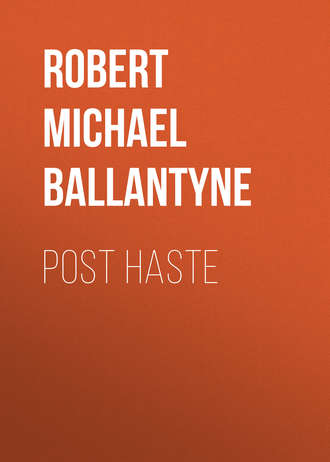
Robert Michael Ballantyne
Post Haste
“Stivergill, mother.”
“Well, Stivergill. It ain’t a pretty name, whichever way you put it. When I heard of the treasure she’s so foolish as to keep on her sideboard, I felt sure that your father had made up his mind to rob Miss Stivergill—with the help of that bad man Bill Stiggs—all the more w’en I see how your father jumped w’en I mentioned Rosebud Cottage. Now, Tottie, we must save your father. If he had only got me to post his letter, I could easily have damaged the address so as no one could read it. As it is, I’ve writ it so bad that I don’t believe there’s a man in the Post-Office could make it out. This is the first time, Tottie, that your father has made up his mind to break into a ’ouse, but when he do make up his mind to a thing he’s sure to go through with it. He must be stopped, Tottie, somehow—must be stopped—but I don’t see how.”
Tottie, who was greatly impressed with the anxious determination of her mother, and therefore with the heinous nature of her father’s intended sin, gave her entire mind to this subject, and, after talking it over, and looking at it in all lights, came to the conclusion that she could not see her way out of the difficulty at all.
While the two sat gazing on the ground with dejected countenances, a gleam of light seemed to shoot from Tottie’s eyes.
“Oh! I’ve got it!” she cried, looking brightly up. “Peter!”
“What! the boy you met at Rosebud Cottage?” asked Mrs Bones.
“Yes. He’s such a nice boy, and you’ve no idea, mother, what a inventor he is. He could invent anythink, I do believe—if he tried, and I’m sure he’ll think of some way to help us.”
Mrs Bones was not nearly so hopeful as her daughter in regard to Peter, but as she could think of nothing herself, it was agreed that Tottie should go at once to the Post-Office and inquire after Peter. She did so, and returned crestfallen with the news that Peter was away on a holiday until the following Monday.
“Why, that’s the 15th,” said Mrs Bones anxiously. “You must see him that day, Tottie dear, though I fear it will be too late. How did you find him out? There must be many Peters among the telegraph-boys.”
“To be sure there are, but there are not many Peters who have helped to save a little girl from a fire, you know,” said Tottie, with a knowing look. “They knew who I wanted at once, and his other name is such a funny one; it is Pax—”
“What?” exclaimed Mrs Bones, with a sudden look of surprise.
“Pax, mother; Peter Pax.”
Whatever Mrs Bones might have replied to this was checked by the entrance of her husband. She cautioned Tottie, in earnest, hurried tones, to say nothing about Rosebud Cottage unless asked, and especially to make no mention whatever of the name of Pax.
Chapter Eighteen.
Business Interfered with in a Remarkable Manner
The modest estimate which Mrs Bones had formed of her penmanship turned out to be erroneous, and her opinion that there was not a man in the Post-Office able to read it was ill-founded. She was evidently ignorant of the powers and intelligence of the Blind Division.
To make this more plain we will follow the letter. You and I, reader, will post ourselves, as it were, and pass through the General Post-Office unstamped. At a few minutes to six p.m. the mouth is wide enough to admit us bodily. Mr Bones has just put in his epistle and walked away with the air of a man who feels that he has committed himself, and is “in for it.” He might have posted it at an office or a pillar nearer home, but he has an idea, founded no doubt on experience, that people, especially policemen, are apt to watch his movements and prefers a longish walk to the General.
There! we take a header and descend with the cataract into the basket. On emerging in the great sorting-room, somehow, we catch sight of the Bones epistle at once. There is no mistaking it. We should know its dirty appearance and awry folding—not to mention bad writing—among ten thousand. Having been turned with its stamp in the right direction at the facing-tables and passed under the stamping-machines without notice, it comes at last to one of the sorters, and effectually, though briefly, stops him. His rapid distributive hand comes to a dead pause. He looks hard at the letter, frowns, turns it upside down, turns his head a little on one side, can make nothing of it, puts it on one side, and continues his work.
But at the Blind Division, to which it is speedily conveyed, our letter proves a mere trifle. It is nothing to the hieroglyphics which sometimes come under the observation of the blind officers. One of these officers gazes at it shrewdly for a few seconds. “William Stiggs, I think,” he says, appealing to a comrade. “Yes,” replies the comrade, “number six little lady—no—aly—oh, Little Alley, Bring—Bringing—ah, Birmingham!”
Just so—the thing is made out almost as quickly as though it had been written in copperplate, and the letter, redirected in red ink, finds its way into the Birmingham mail-bag.
So far so good, but there is many a slip ’twixt the cup and the lip, and other elements were more successful than bad writing in preventing Mr William Stiggs from receiving that letter.
When the mail-bag containing it was put into the Travelling Post-Office van, Mr Bright passed in after it. Our energetic sorter was in charge of the van that night, and went to work at once. The letters to be dropped at the early stages of the journey had to be commenced even before the starting of the train. The letter did not turn up at first. The officials, of whom there were six in the van, had littered their sorting-table and arranged many of the letters, and the limited mail was flying north at full speed before the Bones epistle found its appropriate pigeon-hole—for it must be understood that the vans of the Travelling Post-Office—the T.P.O., as it is familiarly called by its friends—are fitted up on one side with a long narrow table, above which are numerous pigeon-holes, arranged somewhat like those of the sorting-tables in the non-travelling Post-Offices. There is a suggestive difference, however, in the former. Their edges are padded to prevent the sorters’ knuckles and noses from being damaged in the event of violent jolting. The sides and ends of the vans are padded all round to minimise their injuries in the event of an accident. Beyond this padding, however, there are no luxuries—no couches or chairs; only a few things like bicycle saddles attached to the tables, astride which the sorters sit in front of their respective pigeon-holes. On the other side of the van are the pegs on which to hang the mail-bags, a lamp and wax for sealing the same, and the apparatus for lowering and lifting the net which catches the bags.
Everything connected with railways must needs be uncommonly strong, as the weight of materials, coupled with high speed, subjects all the parts of a carriage to extremely violent shocks. Hence the bag-catching affair is a powerful iron frame with rope netting, the moving of which, although aided by a pulley and heavy weight, tries the strength of a strong man.
Nimbly worked the sorters, as they swept by town and field, village, tunnel, bridge, and meadow,—for time may not be wasted when space between towns is being diminished at the rate of forty or fifty miles an hour, and chaos has to be reduced to order. The registered-letter clerk sat in one corner in front of a set of special pigeon-holes, with a sliding cover, which could be pulled over all like a blind and locked if the clerk should have occasion to quit his post for a moment. While some were sorting, others were bagging and sealing the letters. Presently the junior sorter, whose special duty it is to manipulate the net, became aware that a bag-exchanging station drew near. His eyes might have assured him of this, but officers of the Travelling Post-Office become so expert with their ears as to know stations by the peculiarity of the respective sounds connected with them—caused, it might be, by the noise of tunnels, cuttings, bridges, or even slighter influences.
Going quietly to the apparatus above referred to, the junior sorter looked out at the window and lowered the net, which, instead of lying flat against the van, now projected upwards of three feet from it. As he did so something flashed about his feet. He leaped aside and gave a shout. Fearful live creatures were sometimes sent by post, he knew, and serpents had been known before that to take an airing in Post-Office vans as well as in the great sorting-room of St. Martin’s-le-Grand! A snake had only a short time before been observed at large on the floor of one of the night mail sorting carriages on the London and North-Western Railway, which, after a good deal of confusion and interruption to the work, was killed. This flashed into his mind, but the moment was critical, and the junior sorter had no time to indulge in private little weaknesses. Duty required prompt action.
About a hundred yards from the approaching station, a mail-bag hung suspended from a massive wooden frame. The bag weighed nearly eighty pounds. It was fitted so exactly in its place, with reference to the approaching train, that its neck was caught to a nicety in a fork, which swept it with extreme violence off its hook, and laid it in the net. This process, reversed, had been at the same moment performed on the bag given out by the train. To prevent the receiving and delivering apparatus from causing mutual destruction in passing each other, the former is affixed to the upper, the latter to the lower, part of the van. There was a rather severe jerk. The junior sorter exerted his powers, raised the net, and hauled in the bag, while the train with undiminished speed went thundering on.
“What was that I saw on the floor?” asked the junior sorter, looking anxiously round as he set the mail-bags down.
“Only two white mice,” replied Bright, who was busy in front of his pigeon-holes. “They nibbled themselves out of a parcel under my very nose. I made a grab at ’em, but they were too quick for me.”
“Isn’t it strange,” observed the registered-letter clerk, sealing one of the bags which had just been made up, “that people will break the law by sending live animals through the post?”
“More strange, it seems to me,” returned Bright, as he tied up a bundle of letters, “that the people who do it can’t pack ’em properly.”
“There’s the next station,” said the junior sorter, proceeding once more to the net.
“Whew!” shrieked the steam-whistle, as the train went crashing towards the station. Bright looked out. The frame and its mail-bags were all right and ready. The net was lowered. Another moment and the mail-bags were swept into the van, while the out-going bags were swept off the projecting arm into the fixed net of the station. The train went through the station with a shriek and a roar. There was a bridge just beyond. The junior sorter forgot to haul up the net, which caught some object close to the bridge—no one knew what or how. No one ever does on such occasions! The result was that the whole apparatus was demolished; the side of the van was torn out, and Mr Bright and the junior sorter, who were leaning against it at the time, were sent, in a shower of woodwork, burst bags, and letters, into the air. The rest of the van did not leave the rails, and the train shot out of sight in a few seconds, like a giant war-rocket, leaving wreck and ruin behind!
There are many miraculous escapes in this world. Mr Bright and the junior sorter illustrated this truth by rising unhurt from the débris of their recent labours, and began sadly to collect the scattered mails. These however were not, like their guardians, undamaged. There were several fatal cases, and among these was the Bones epistle. That important document had been caught by a mass of timber and buried beyond recovery in the ballast of the line.
But why pursue this painful subject further? It is sufficient to say that although the scattered mails were carefully collected, re-sorted, and, finally, as far as possible, delivered, the letter with which we have specially to do never reached its destination. Indeed, it never more saw the light of day, but remained in the hole where it had been buried, and thus it came to pass that Mr William Stiggs failed to make his appearance on the appointed night of the 15th, and Abel Bones was constrained to venture on his deed of darkness alone.
On the appointed night, however, Tottie did not fail to do her best to frustrate her father’s plans. After a solemn, and last, consultation with her mother, she left her home with fluttering heart and dry tongue, and made for the General Post-Office.
Chapter Nineteen.
Deep-Laid Plans for Checkmating Mr Bones
Now it chanced that the Post-Office Message-boys’ Literary Association had fixed to hold its first grand soirée on the night of the 15th.
It was a great occasion. Of course it was held in Pegaway Hall, the shed in rear of Solomon Flint’s dwelling. There were long planks on trestles for tables, and school forms to match. There were slabs of indigestible cake, buns in abundance, and tea, with milk and sugar mixed, in illimitable quantities. There were paper flowers, and illuminated texts and proverbs round the walls, the whole being lighted up by two magnificent paraffin lamps, which also served to perfume the hall agreeably to such of the members and guests as happened to be fond of bad smells.
On this particular evening invitations had been issued to several friends of the members of the Association, among whom were Mr Enoch Blurt and Mr Sterling the missionary. No ladies were invited. A spirited discussion had taken place on this point some nights before the soirée, on which occasion the bashful Poker opposed the motion “that invitations should be issued to ladies,” on the ground that, being himself of a susceptible nature, the presence of the fair sex would tend to distract his attention from the business on hand. Big Jack also opposed it, as he thought it wasn’t fair to the fair sex to invite them to a meeting of boys, but Big Jack was immediately called to order, and reminded that the Society was composed of young men, and that it was unmanly—not to say unmannerly—to make puns on the ladies. To this sentiment little Grigs shouted “Hear! hear!” in deafening tones, and begged leave to support the motion. This he did in an eloquent but much interrupted speech, which was finally cut short by Macnab insisting that the time of the Society should not be taken up with an irrelevant commentary on ladies by little Grigs; whereupon Sandy Tod objected to interruptions in general—except when made by himself—and was going on to enlarge on the inestimable blessing of free discussion when he was in turn called to order. Then Blunter and Scroggins, and Fat Collins and Bobby Sprat, started simultaneously to their feet, but were put down by Peter Pax, who rose, and, with a calm dignified wave of his hand, remarked that as the question before the meeting was whether ladies should or should not be invited to the soirée, the simplest plan would be to put it to the vote. On this being done, it was found that the meeting was equally divided, whereupon the chairman—Phil Maylands—gave his casting vote in favour of the amendment, and thus the ladies were excluded from the soirée amid mingled groans and cheers.
But although the fair sex were debarred from joining in the festivities, they were represented on the eventful evening in question by a Mrs Square, an angular washer-woman with only one eye (but that was a piercingly black one), who dwelt in the same court, and who consented to act the double part of tea-maker and doorkeeper for that occasion. As most of the decorations and wreaths had been made and hung up by May Maylands and two of her telegraphic friends, there was a pervading influence of woman about Pegaway Hall, in spite of Phil’s ungallant and un-Irish vote.
When Tottie Bones arrived at the General Post-Office in search of Peter Pax, she was directed to Pegaway Hall by those members of the staff whose duties prevented their attendance at the commencement of the soirée.
Finding the hall with difficulty, she was met and stopped by the uncompromising and one-eyed stare of Mrs Square.
“Please, ma’am, is Mr Peter Pax here?” asked Tottie.
“Yes, he is, but he’s engaged.”
Tottie could not doubt the truth of this, for through the half-open door of the hall she saw and heard the little secretary on his little legs addressing the house.
“Please may I wait till he’s done?” asked Tottie.
“You may, if you keep quiet, but I doubt if he’ll ’ave time to see you even w’en he is done,” said the one-eyed one, fiercely.—“D’you like buns or cake best?”
Tottie was much surprised by the question, but stated at once her decided preference for cake.
“Look here,” said Mrs Square, removing a towel from a large basket.
Tottie looked, and saw that the basket was three-quarters full of buns and cakes.
“That,” said the washer-woman, “is their leavin’s. One on ’em called it the debree of the feast, though what that means is best known to hisself. For one hour by the clock these literairies went at it, tooth an’ nail, but they failed to get through with all that was purwided, though they stuffed themselves to their muzzles.—There, ’elp yourself.”
Tottie selected a moderate slab of the indigestible cake, and sat down on a stool to eat it with as much patience as she could muster in the circumstances.
Peter Pax’s remarks, whatever else they might have been considered, possessed the virtue of brevity. He soon sat down amid much applause, and Mr Sterling rose to speak.
At this point Tottie, who had cast many anxious glances at a small clock which hung in the outer porch or vestibule of the hall, entreated Mrs Square to tell Pax that he was wanted very much indeed.
“I durstn’t,” said Mrs Square; “it’s as much as my sitooation’s worth. I was told by Mr Maylands, the chairman, to allow of no interruptions nor anythink of the kind.”
“But please, ma’am,” pleaded Tottie, with such an earnest face that the woman was touched, “it’s a matter of—of—life an’ death—at least it may be so. Oh! do-o-o-o tell ’im he’s wanted—by Tottie Bones. Only say Tottie Bones, that’ll be sure to bring ’im out.”
“Well—I never!” exclaimed Mrs Square, sticking her fists in her waist and leaning her head to one side in critical scrutiny of her small petitioner. “You do seem cock-sure o’ your powers. H’m! p’r’aps you’re not far out neither. Well, I’ll try it on, though it may cost me a deal of abuse. You sit there an’ see that cats don’t get at the wittles, for the cats in this court are a sharper set than or’nar.”
Mrs Square entered the hall, and begged one of the members near the door to pass up a message—as quietly as possible—to the effect that Mr Pax was wanted.
This was immediately done by the member shouting, irreverently, that the secretary’s mother “’ad come to take ’im ’ome.”
“Order, order! Put ’im out!” from several of the members.
“Any’ow, ’e’s wanted by some one on very partikler business,” growled the irreverent member, and the secretary made his way to the door.
“W’y, Tottie!” exclaimed Pax, taking both the child’s hands patronisingly in his, “what brings you here?”
With a furtive glance at Mrs Square, Tottie said, “Oh! please, I want to speak about something very partikler.”
“Indeed! come out to the court then,” said little Pax, leading the way; “you’ll be able to air the subject better there, whatever it is, and the cats won’t object. Sorry I can’t take you into the hall, little ’un, but ladies ain’t admitted.”
When the child, with eager haste, stated the object of her visit, and wound up her discourse with the earnest remark that her father must be stopped, and mustn’t be took, her small counsellor looked as perplexed and anxious as herself. Wrinkling up his smooth brow, he expressed the belief that it was a difficult world to deal with, and he had had some trouble already in finding out how to manage it.
“You see, Tot,” he said, “this is a great evenin’ with the literary message-boys. Not that I care a rap for that, but I’ve unfortunately got to move a vote of thanks to our lecturer to-night, and say somethin’ about the lecture, which I couldn’t do, you know, unless I remained to hear it. To be sure, I might get some one else to take my place, but I’m not easily spared, for half the fun o’ the evenin’ would be lost if they hadn’t got me to make game of and air their chaff upon. Still, as you say, your dad must have his little game stopped. He must be a great blackg— I beg pardon, Tot, I mean that he must be a great disregarder of the rights of man—woman, as it happens, in this case. However, as you said, with equal truth, he must not be took, for if he was, he’d probably be hanged, and I couldn’t bear to think of your father bein’ scragged. Let me see. When did you say he meant to start?”
“He said to mother that he’d leave at nine, and might ’ave to be out all night.”
“At nine—eh? That would just give ’im time to get to Charing Cross to catch the 9:30 train. Solomon Flint’s lecture will be over about eight. I could polish ’im off in ten minutes or so, and ’ave plenty of time to catch the same train. Yes, that will do. But how am I to know your father, Tot, for you know I haven’t yet had the pleasure of makin’ his acquaintance?”
“Oh, you can’t mistake him,” replied the child confidently. “He’s a big, tall, ’andsome man, with a ’ook nose an’ a great cut on the bridge of it all down ’is left cheek. You’ll be sure to know ’im. But how will you stop ’im?”
“That is more than I can tell at present, my dear,” replied Pax, with a careworn look, “but I’ll hatch a plot of some sort durin’ the lecture.—Let me see,” he added, with sudden animation, glancing at the limited portion of sky that roofed the court, “I might howl ’im down! That’s not a bad idea. Yellin’ is a powerful influence w’en brought properly to bear. D’you mind waitin’ in the porch till the lecture’s over?”
“O no! I can wait as long as ever you please, if you’ll only try to save father,” was Tottie’s piteous response.
“Well, then, go into the porch and sit by the door, so that you can hear and see what’s goin’ on. Don’t be afraid of the one-eyed fair one who guards the portals. She’s not as bad as she looks; only take care that you don’t tread on her toes; she can’t stand that.”
Tottie promised to be careful in this respect, and expressed a belief that she was too light to hurt Mrs Square, even if she did tread on her toes accidentally.
“You’re wrong, Tottie,” returned Pax; “most females of your tender years are apt to jump at wrong conclusions. As you live longer you’ll find out that some people’s toes are so sensitive that they can’t bear a feather’s weight on ’em. W’y, there’s a member of our Society who riles up directly if you even look at his toes. We keep that member’s feet in hot water pretty continuously, we do.—There now, I’ll be too late if I keep on talkin’ like this. You’ll not feel tired of the lecture, for Solomon’s sure to be interesting, whatever his subject may be. I don’t know what it is—he hasn’t told us yet. You’ll soon hear it if you listen.”
Pax re-entered the hall, and Tottie sat down by the door beside Mrs Square, just as Solomon Flint rose to his legs amid thunders of applause.







